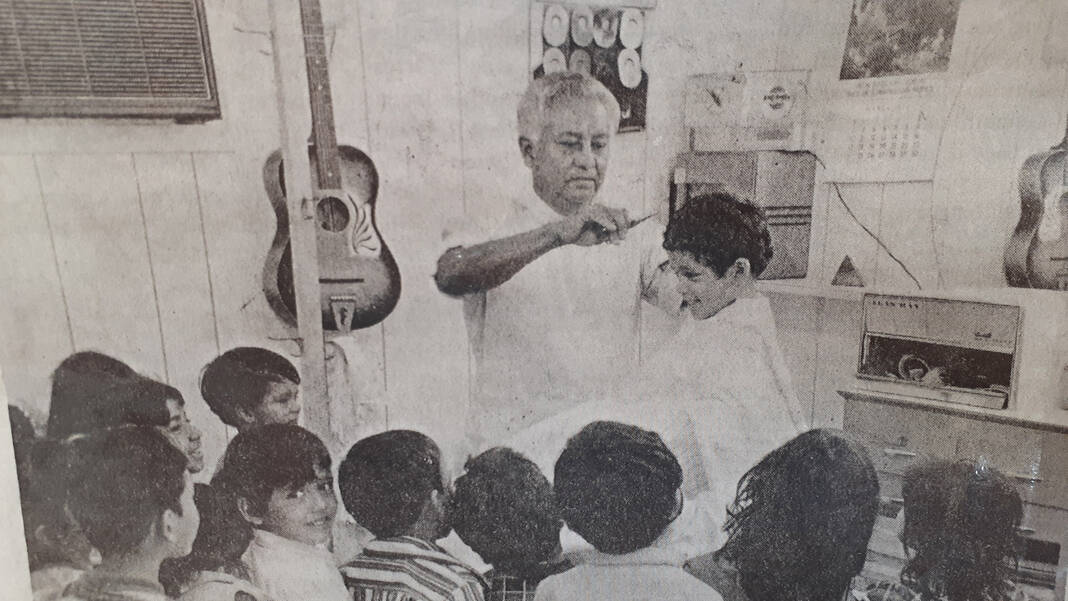|
Only have a minute? Listen instead
Getting your Trinity Audio player ready...
|

With its white picket fence, iconic barber pole, and Old Glory waving proudly atop a flagpole, Serda’s Barber Shop exudes Americana. It’s a scene one might find in a Norman Rockwell painting.
The old-school barber shop in Pharr was founded Aug. 2, 1948 by the late Gabriel Serda, a local hero who returned home after surviving more than two years as a prisoner of war after being captured by the Nazis in Northern Africa.
Today the shop, which marked its 75th anniversary this summer, is now run by Serda’s son, Javier, who says his father began cutting hair during his 26 months of captivity.
“The Germans didn’t have enough men to take care of the POWs,” Serda said, recalling the story passed on to him by his father. “So they selected the cooks, medics, electricians, barbers, and carpenters from the ranks of the POWs to do these jobs. My dad was one of the barbers.”

Serda’s Barber Shop is still in its original building at the corner of Bell Avenue and Athol Street, and the family home where Javier grew up is also still there at the back of the property. Javier, who is four months older than the shop his father founded, is researching historical records for the longest, continuously owned barber shops in Texas.
“There were two other barber shops here in Pharr older than this one, but they were not continuous,” Serda noted. “I believe this is the oldest continuous barber shop in the Valley, and we are checking the records to see if it might be the oldest in Texas that’s still under the same ownership, but we’re not sure yet.”
Inside the shop, the walls are filled with historical and family memorabilia and photos. It’s a quaint setting, with two barber chairs and a shoe shine stand.
Javier says his father charged 35 cents for a haircut when the shop first opened. By 1968, when Javier started cutting hair, the fee was $1.25. Today, the going rate is $15.
Javier didn’t plan on being a barber. He wanted to be a baseball player when he graduated high school, but when that didn’t work out, he decided to follow in his father’s footsteps.
He says the keys to being a successful barber are cleanliness, the ability to get along with people, and the ability to just listen.
“Sometimes my customers tell me I should have been a priest,” Javier said with a laugh. “A lot of people tell me about their personal problems, and I’m over here thinking I need to get some holy water and bless them!”

None of Javier’s kin are barbers, but one of his younger brothers, Angel, remembers shining shoes as a young boy at his father’s shop.
“I shined shoes in the 60s to earn extra money,” Angel recalled. “It was always a fun place to come, because like my brother said, people come here to vent and joke around. So if you ever wanted to hear what was happening around Pharr, you came to the barber shop.”
Javier says he can do every kind of haircut there is or ever has been – from pompadours, to flat tops, to fades. In fact, he says today’s hairstyles are just revised versions of yesterday’s hairstyles.
“I used to do the fade back in the 60s,” said Javier. “All this stuff you see going on with the kids these days, I used to do ‘em. We used to have a haircut called the Little League haircut. It was faded on the sides and a little longer on the top and front that looked like the bill of a baseball cap.”
Javier says he only cuts hair three days a week now, but he’ll continue doing it for as long as he can. He has hope that one of his grandsons might someday take over for him, but that it will be OK with him if that doesn’t happen.
“If I was to die right now I would be happy, because I have enjoyed it,” Javier mused. “I have been blessed to be able to do what I enjoy in life. The shop will go to my daughter when I die and I told her not to feel obligated to continue the tradition. I told her if you want to sell it, rent it, or give it away, I am content with the years I was able to spend here.”



